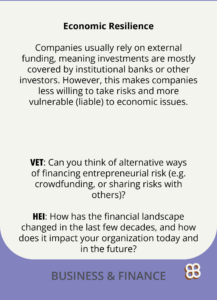Economic resilience
Economic Resilience refers to the ability of fashion businesses and the overall fashion industry to withstand and adapt to economic disruptions, shocks, and changing market conditions while maintaining their operations, profitability, and long-term sustainability. It involves strategies and practices that enable fashion companies to navigate uncertainties and challenges, ensuring their continued viability in the face of economic fluctuations.
Adaptability to changing market conditions
Economic resilience in the fashion domain requires the ability to adapt to changing market conditions. This includes monitoring and analyzing market trends, user preferences, and competitive dynamics. Fashion businesses need to stay agile and flexible, adjusting their product offerings, pricing strategies, and marketing approaches to meet evolving customer demands and market trends. This adaptability helps fashion companies stay competitive and relevant in the face of economic uncertainties.
Diversification of product portfolio
Economic resilience involves diversifying the product portfolio to reduce dependence on a single product or market segment. Fashion companies can expand their offerings to include a range of products, styles, and price points, targeting different customer segments. By diversifying their product portfolio, fashion businesses can mitigate the risks associated with fluctuations in demand and market preferences. It enables them to capture opportunities in various market segments and reduces the impact of economic downturns on their overall revenue.
Supply chain optimization
An essential aspect of economic resilience in the fashion domain is optimizing the supply chain. This involves building strong relationships with suppliers, ensuring efficient inventory management, and having contingency plans in place for disruptions such as raw material shortages, transportation delays, or labor issues. By establishing robust supply chain networks, fashion companies can respond swiftly to changes in demand and minimize the impact of external economic shocks.
Financial stability and risk management
conomic resilience requires maintaining financial stability and implementing effective risk management strategies. Fashion businesses need to have sound financial practices, including managing cash flow, controlling costs, and diversifying funding sources. They should also assess and manage risks associated with currency fluctuations, interest rates, and market volatilities. By maintaining financial stability and implementing risk mitigation measures, fashion companies can better withstand economic downturns and position themselves for long-term success.
Embracing sustainability and ethical practices
Economic resilience in the fashion domain is closely tied to sustainability and ethical practices. Fashion businesses that prioritize sustainable sourcing, responsible manufacturing, and ethical labor practices are better positioned to navigate evolving user expectations and regulatory requirements. By incorporating sustainable practices, fashion companies can enhance their reputation, attract conscious users, and mitigate the risks associated with changing societal values and environmental concerns.
Innovation and technology adoption
Economic resilience also involves embracing innovation and leveraging technology advancements. Fashion companies that invest in research and development, adopt innovative manufacturing techniques, and leverage digital technologies for marketing and operations are better equipped to adapt to changing economic conditions. By staying at the forefront of technological advancements, fashion businesses can improve efficiency, reduce costs, enhance user experiences, and gain a competitive edge.
Case studies
H&M (Hennes & Mauritz)
H&M is a globally recognized fashion retailer that has implemented various strategies to enhance economic resilience. The company focuses on diversifying its product offerings, targeting different market segments with brands like COS and & Other Stories. H&M also emphasizes sustainability and ethical practices by promoting garment recycling and offering conscious collections made from sustainable materials.
Nike
Nike, a leading sportswear brand, has demonstrated economic resilience by adopting innovative technologies and leveraging digital platforms. The company invests in research and development to introduce performance-enhancing materials and manufacturing processes. Nike’s direct-to-user strategy, supported by e-commerce platforms and personalized experiences, enables the company to adapt to changing user behaviors and market trends.
Levi Strauss & Co.
Levi’s, a renowned denim brand, showcases economic resilience through its supply chain optimization efforts. The company collaborates with suppliers to ensure responsible sourcing of raw materials and implements efficient inventory management systems. Levi’s also invests in sustainable practices, such as reducing water usage and promoting worker well-being, aligning with its commitment to social and environmental responsibility.
Inditex Group
Inditex, the parent company of Zara, implements economic resilience strategies through its agile supply chain and quick response to market demands. The company’s vertically integrated business model enables efficient production and distribution, allowing Zara to adapt its product offerings in response to emerging trends rapidly. Inditex also emphasizes sustainability initiatives, such as its “Closing the Loop” program, which promotes garment recycling and circularity.
References
D’Adamo, Idiano, and Gianluca Lupi. “Sustainability and resilience after COVID-19: A circular premium in the fashion industry.” Sustainability 13.4 (2021): 1861.
Martinez-de-Albeniz, Victor and Aparicio, Diego and Balsach, Jordi, The Resilience of Fashion Retail Stores (November 1, 2022).
Hileman, Jacob, et al. “A Sustainable and Resilient Circular Fashion and Textiles Industry: Towards a Circular Economy That Respects and Responds to Planetary Priorities.” Zenodo, 25 Feb. 2021, zenodo.org/record/4561848.
